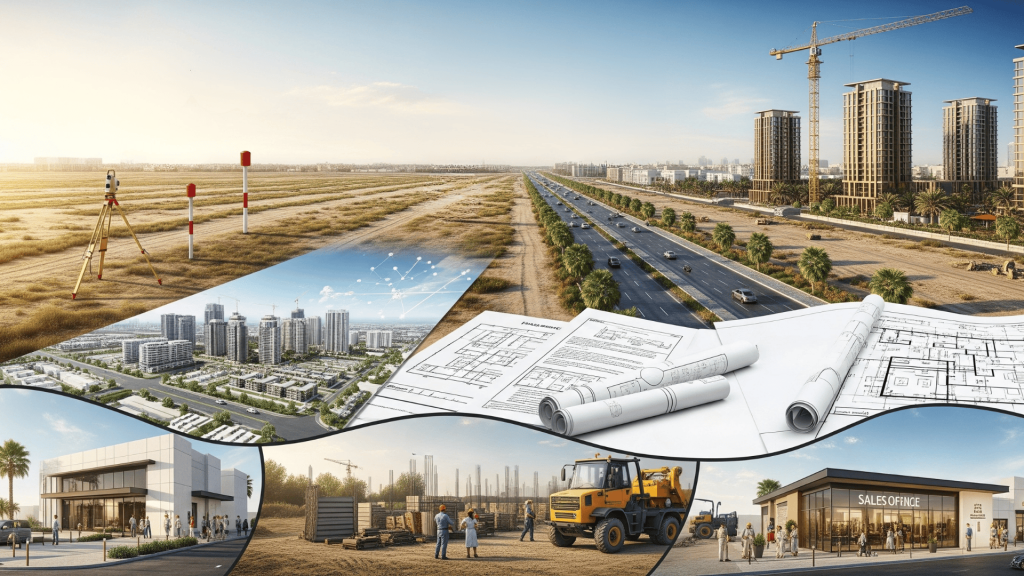Real estate development involves converting land into properties for residential, commercial, or mixed-use purposes. It requires close coordination between professionals in finance, design, law, and sales.
This work plays a major role in shaping cities and neighborhoods. Developers contribute to housing supply, commercial growth, and infrastructure, working through legal codes, funding structures, and market needs to complete successful projects.
Business Setup Options: Mainland vs Free Zone
When establishing a real estate company in Dubai, the first decision is whether to operate on the mainland or in a free zone. A mainland setup allows full access to the Dubai property market, enabling direct engagement in sales, leasing, and development.
This route is ideal for brokerages and developers seeking visibility and access to UAE residents.
In contrast, a free zone setup offers benefits such as full foreign ownership, tax exemptions, and simplified registration, but it comes with restrictions. Companies registered in free zones may require additional DLD and RERA approvals to operate directly within Dubai’s property market.
While better suited for international consultancies or support firms, they may not be ideal for core brokerage operations.
Financing and Budget Structuring
Funding is the foundation of every development. Projects rely on a combination of equity and debt, distributed across major budget categories.
A clear structure helps ensure the project can be completed without financial shortfalls.
| Element | Description |
|---|---|
| Equity Sources | Developer capital, angel investors, and institutional partners |
| Debt Sources | Construction loans, permanent financing, and bridge loans |
| Budget Elements | Land, construction, soft costs, contingency, marketing |
| Key Metrics | IRR, ROI, break-even point, cash flow forecasts |
This structure allows developers to stay prepared as the project moves forward. Matching funding timelines with project phases reduces pressure on cash flow and allows smoother progress from start to finish.
Detailed Cost Breakdown of Setting Up a Real Estate Business in Dubai
| Expense Category | Estimated Cost (AED) Mainland | Estimated Cost (AED) Free Zone | Notes/Details |
|---|---|---|---|
| Real Estate License | 12,950–15,000 | 12,900+ | Mainland: professional license; Free Zone: varies by zone. |
| RERA Activity Fee | 5,020 (per activity) | Usually included in the license | Mainland only; Free Zone may have different requirements. |
| RERA Training & Exam | 3,200–6,500 (training); 3,200–15,750 (exam) | Not always required | Exam fee depends on education; training cost varies by provider. |
| Trade Name Registration | Variable (est. 1,000–3,000) | Variable (often included) | One-time fee for reserving a unique trade name. |
| Office Rental | Variable (depends on size/location) | Not always required | Mainland: mandatory; Free Zone: optional or virtual office possible. |
| Ejari (Office Registration) | Variable (est. 2,000–4,000) | Not always required | Mainland: required for office lease registration. |
| Legal & Notary Fees | Variable | Variable | For MOA, contracts, etc. |
| Visa Costs | Variable (per employee/partner) | Variable (per employee/partner) | Not included in license cost; depends on number and type of visas. |
| Additional Government Fees | Variable | Variable | Includes approvals, attestations, etc. |
| Estimated Total Starting Cost | 21,000+ (excluding office/visa) | 12,900+ (excluding office/visa) | The actual total may be higher with office, visas, and other fees. |
Note: All figures are estimates as of 2025 and may change. Always verify current costs with business setup consultants or government authorities.
Choosing an Office Location for Your Dubai Real Estate Firm
Choosing an office location for your Dubai real estate firm is a strategic decision that directly impacts your ability to obtain licenses, sponsor employee visas, and operate legally.
The space must be a registered commercial unit; residential addresses are not permitted, and it must comply with RERA’s minimum size requirements, typically around 200 square feet or more, depending on the number of brokers.
Additionally, the lease must be registered through the Ejari system, a mandatory step for securing trade licenses and completing company formation.
Proper zoning is equally important, as some buildings or areas may require specific layout approvals and signage regulations.
Prime business districts like Business Bay and Downtown Dubai offer prestige and accessibility, while more cost-effective options such as Jumeirah Lake Towers (JLT) or Dubai Silicon Oasis provide functional alternatives for newer firms.
While shared or serviced offices may work well for consultancies or support businesses, brokerage firms are generally expected to maintain fully compliant, dedicated commercial office spaces.
Business Models and Legal Structures in Dubai Real Estate
Dubai classifies real estate businesses into four major categories: brokerage, development, consultancy, and leasing/property management. Each model has unique licensing, compliance, and capital requirements. For example, brokerages must register with RERA and complete training, while developers need escrow accounts and project registration with the Dubai Land Department (DLD).
You must also choose a legal structure. Common options include:
- Sole Establishment – Owned by a single individual, suitable for solo consultants.
- Limited Liability Company (LLC) – Ideal for partnerships and scalable teams.
- Civil Company – Designed for professional services; expat-friendly.
- Free Zone Company – Offers 100% foreign ownership under a specific jurisdiction.
Since 2020, most real estate business types no longer require a local Emirati sponsor, a key benefit for foreign investors.
Licensing and Regulatory Compliance in Dubai
To legally operate a real estate company in Dubai, you must fulfill all licensing obligations governed by the DLD, RERA, and DET. This includes:
- Trade License – Issued by DET or a free zone authority for your specific business activity.
- RERA Registration & Broker ID – Brokers must complete mandatory training and pass the certification exam.
- MOA (Memorandum of Association) – Defines shareholders’ roles and must be notarized.
- Trakheesi System – Enables property marketing and listing permissions.
- Ejari-registered Office – Required for most licensing steps and visa issuance.
Compliance ensures not just legal operation, but also access to trusted platforms and investor confidence.
Core Stages of the Development Process
The real estate development process follows a logical sequence. Each stage supports the one before and directly impacts the outcome of the project.
- Conceptualization – This step outlines the project’s objectives and general direction. It clarifies what the developer intends to build and why it fits the market.
- Land Acquisition – Developers locate and negotiate for suitable parcels. Initial studies focus on zoning, market value, and use potential.
- Planning & Design – Engineers, planners, and construction consultants shape the layout. The focus is on usability, safety, and compliance.
- Financing – Capital is raised through investors or borrowed from lenders. Financial models are used to evaluate the project’s risks and returns.
- Construction – This phase brings the plan to life. Contractors, project managers, and site workers follow timelines and budgets closely.
- Sales or Leasing – Finished units are marketed and either leased or sold, depending on the developer’s business plan and market response.
Each of these stages requires thorough planning and solid execution. Mistakes or delays in one area can impact the entire project.
Looking for guidance on your next development?
At Menaherald, we help property teams turn ideas into feasible, buildable projects. Our consultants understand the steps, the risks, and the strategies needed to move from land search to asset delivery. Let’s start the conversation today.
Land Acquisition and Feasibility Analysis
The first step in development success is choosing the right location. Developers search for parcels that fit their goals and budgets.
Once identified, they conduct due diligence to verify title ownership, zoning, and environmental constraints.
A full analysis helps determine whether the site is suitable and profitable. Legal risks, cost projections, and expected demand must all be measured.
Getting this stage right lowers the chance of early-stage problems that can later become difficult or expensive to fix.
Design, Permitting, and Regulatory Compliance
After acquiring land and finalizing financials, the project moves to technical planning. Engineers and construction experts create detailed plans, ensuring the design fits both use and legal codes.
They also work to submit plans to city or regional offices for approval.
In cities like Dubai, you must register with bodies like:
- DLD (Dubai Land Department)
- RERA (Real Estate Regulatory Agency)
- DET (Department of Economy and Tourism)
These bodies ensure the project’s legality, accountability, and transparency.
These approvals include zoning verification, site access, utility checks, and permit applications. If a project fails to meet legal requirements, it can be delayed or rejected.
That’s why managing the approval process carefully is key to staying on track.
Construction Management and Execution
When all permits are secured, the project enters the building phase. This part of the process must follow clear steps and include proper supervision.
Each phase includes different teams, all working together toward a shared goal.
Here are the Construction Phases and Stakeholders:
| PHASE | ACTIVITIES | KEY STAKEHOLDERS |
|---|---|---|
| Pre-construction | Site prep, procurement, scheduling | Project manager, GC |
| Active Construction | Core build, inspections, reporting | Contractors, site engineers |
| Post-construction | Punch list, final checks, handover | Developer, client |
Staying on schedule requires strong communication between all parties. If issues are addressed early, timelines and budgets are easier to maintain.
Development Agreements and Escrow in Dubai Real Estate
For developers, Dubai mandates strict financial and legal procedures. Every project must be registered with the DLD and backed by an escrow account. This ensures investor funds are protected and used solely for that project.
Additionally, development agreements define land use, utility responsibilities, and compliance obligations between the developer and the government. Without these, projects can’t proceed through formal channels.
Escrow management, legal documentation, and milestone-based withdrawals safeguard both buyers and the market’s long-term integrity.
Marketing, Sales, and Leasing Strategy
Once the property is ready, it must be introduced to the market. Research helps determine who the buyers or renters are, what prices they will accept, and how the property should be promoted.
The final leg focuses on positioning:
- Identify target market segments
- Tailor pricing and promotional efforts
- Partner with brokerages or sell directly
- Consider short-term vs. long-term gains
In Dubai, commission-based models dominate. Brokers typically earn:
| DEAL TYPE | STANDARD COMMISSION | BROKER SHARE |
|---|---|---|
| Property Sale | 2% of deal value | 50–70% |
| Rental Agreements | 5% of the annual rent | 50–80% |
A well-calibrated go-to-market strategy drives returns and investor satisfaction.
Developers may choose to lease units for regular income or sell them to recover their investment. The decision depends on their long-term goals, local demand, and broader financial conditions.
A smart sales or lease plan increases occupancy and helps meet return targets.
Risk Factors and Key Challenges
No development is without its share of risks. Understanding common problems allows teams to prepare early and reduce costly delays.
Common Development Risks
- Regulatory Delays: Permits may take longer due to policy changes or complex approvals.
- Cost Overruns: Budgets can rise due to price spikes or added features.
- Market Downturns: Changes in supply and demand affect how fast units are sold or rented.
- Legal Issues: Title errors, zoning disputes, or lawsuits can stop progress entirely.
Planning for these issues ahead of time increases the odds of completing the project successfully and within budget.
Final Insights and Strategic Considerations
Real estate development calls for precise coordination across design, law, budgeting, and timing. The most successful projects are those that begin with clear planning and remain flexible when faced with setbacks.
Strong communication across every role, from zoning consultant to project manager, can make a major difference in keeping the timeline and budget on track.
Adapting to the market, building meaningful connections with local officials, and staying responsive to changes will help developers maintain long-term value. Aligning all phases early, from financial planning to final inspection, leads to better outcomes and fewer setbacks.
Frequently Asked Questions
What Is The Growth Rate Of Real Estate In The UAE?
The UAE real estate market showed a strong recovery after 2020. Dubai’s property prices increased by 9.25% in 2021, while Abu Dhabi saw a 1.5% rise. Transaction volumes returned to pre-pandemic levels as the housing market bounced back significantly.
What Is The Future Of Real Estate In the UAE?
The UAE real estate market looks promising for the coming years. Dubai is expected to see 5-8% annual price growth with 7% average rental yields according to 2025 forecasts. The market is performing well with transaction values jumping 34% in 2023 and off-plan properties making up 60% of all sales.
Is Real Estate A Good Career In the UAE?
Yes, real estate is an excellent career choice in the UAE. Property agents are in high demand in Dubai due to the city’s active development projects and growing market. The constant flow of expat residents and a high number of property transactions create steady demand for real estate professionals.
What Is The Outlook For Dubai Real Estate In 2025?
Dubai’s property market will continue growing in 2025. Prime real estate values are expected to increase by 5% due to population growth and limited luxury property supply. Rental prices in premium areas are also rising as more expatriates move to the city, creating strong demand for quality properties.


